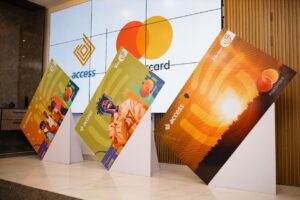- New tiered proposition brings digital finance, early financial literacy and lifestyle benefits to Ghanaians aged 13 to 40.
In a bold move to help empower the next generation with early access to financial tools and knowledge, Mastercard and Access Bank (Ghana) PLC have launched an innovative, age-segmented card under the Bank’s youth banking proposition, AccessU.
This unique offering is designed to empower Ghanaians aged 13 to 40 with essential financial solutions that align with different life stages and evolving aspirations. This new proposition is structured into three key life stages: teens, young professionals, and middle-established professionals —with each stage offering tailored features that meet the evolving financial needs of Ghanaians.
For teens, the offering includes a prepaid or reloadable debit card with parental controls, expense-tracking tools, and scheduled allowances, aimed at teaching budgeting, saving, and financial responsibility. In addition, the card offers discounts on gaming, streaming services, and educational platforms.
As users transition to young professionals, the card evolves to include a debit card paired with an entry-level credit card, using soft credit scoring to help first-time borrowers establish credit. This stage also introduces Buy Now, Pay Later (BNPL) integrations for e-commerce, travel, and gadgets, along with exclusive rewards on subscriptions such as Netflix and Spotify.

The offering further supports wealth-building with investment-backed cashback cards. For middle-established professionals, the product expands to premium debit and credit cards that offer travel, lifestyle, career advancement and health insurance benefits, as well as business and SME-linked corporate cards for entrepreneurs and executives.
This initiative is part of Access Bank and Mastercard’s broader agenda to close Ghana’s financial inclusion gap. Ghana has a young age structure, with approximately 57% of the population under the age of 25, which emphasizes the importance of initiatives targeting this age group. By providing accessible, customized financial tools at critical life stages, the collaboration aims to cultivate a financially empowered, digitally included generation.
“This launch reflects our shared commitment with Access Bank Ghana to shape a more financially confident and digitally included generation. By embedding financial literacy and secure digital tools from an early age, we are empowering Ghana’s youth to grow into financially responsible adults while also giving families peace of mind and contributing to a more inclusive digital economy,” said Folasade Femi-Lawal, Country Manager and Area Business Head for West Africa at Mastercard.
Pearl Nkrumah, Executive Director, Retail & Digital Banking at Access Bank Ghana, added: “Our youth are not just the future, they are the now. Through our collaboration with Mastercard, we are not just offering banking solutions to young people, but we are enhancing their job market readiness, creating recruitment opportunities, empowering young entrepreneurs, and equipping them to achieve their dreams and impact Ghana and the rest of the world. This is about giving them agency over their financial choices, helping them to thrive, save, spend wisely, and dream bigger.”
As part of the broader collaboration, Mastercard and Access Bank Ghana aim to also design a compelling proposition for women under the Bank’s flagship women banking initiative, the ‘W’ Initiative, further advancing their goal to empower women financially and professionally.
The age-segmented card will be made available across Access Bank’s physical branches and digital network. This Mastercard-Access Bank collaboration presents new opportunities for fintechs, merchants and educational partners to engage Ghanaians in more meaningful and responsible ways.
The initiative also reinforces Access Bank Ghana’s positioning as a future-focused and youth-centric bank while supporting Mastercard’s commitment to advancing financial inclusion across Africa. The launch sets a new benchmark for how financial institutions can support young people and their families in today’s digital-first economy.










